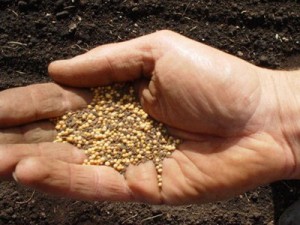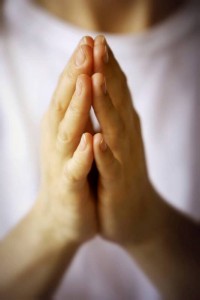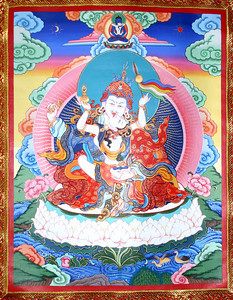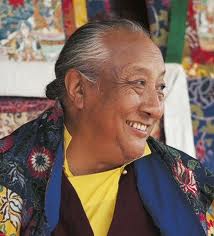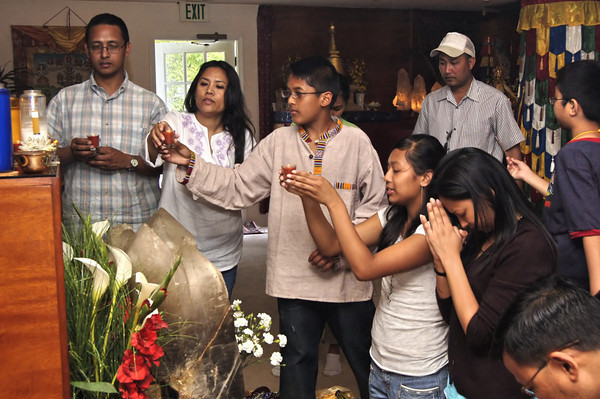
The following is adapted from an oral commentary given by His Holiness in conjunction with a ceremony wherein he bestowed the bodhisattva vow upon a gathering of disciples at Namdroling in Bozeman, Montana, November 1999:
Next, go for refuge in the sublime supports, the buddha as the embodiment of the three mayas, the dharma as the representation of all scriptural transmissions and realization, and the sangha as those who have attained the irreversible path of the sublime ones. From this moment until enlightenment, in order to liberate all parent sentient beings from their suffering, develop compassion. Realize that [in order] to accomplish your goal, aside from reliance on the Three Jewels of refuge, there is no other support for refuge. I would be impossible for you to bring all beings to liberation without the buddha, dharma, and sangha. With irreversible faith and devotion, repeat the vows of refuge.
According to the Mahayana path, we take refuge in the teacher who shows us the path to liberation: that is buddha. We engage on the path of Mahayana practice by cultivating the precious bodhicitta until we realize buddhahood: that is the dharma. The sangha is the spiritual community that is on the same path as we are on, assisting in the accomplishment of our mutual goals.
Next is the method for accumulating merit. Visualize in space in front a magnificent throne supported by eight lions, where your teacher sits, indivisible with Lord Buddha Shakyamuni. The eight arhats and a vast assembly of buddhas and bodhisattvas surround him like masses of clouds that fill the ten directions. Imagine countless emanations of yourself filling the entire pure realm of your environment, which includes the entire universe. You can countless emanations of yourself and all parent sentient beings join together to fill [all of] space. With humility, reverence, and faith, you and they all bow down and pay homage to the objects of refuge in the space in front. [Here you] prostrate by touching the five places of your body to the ground. That is the branch of prostration, a powerful antidote for pride. Having pride means having an attitude of cherishing yourself by thinking you are so great and special. Performing prostrations purifies that egoistic attitude.
Now visualize that you and innumerable emanations of yourself present boundless offerings. Offer all of your wealth and endowments, including the root of all virtue in this lifetime, all your past lifetimes, and in future lifetimes. Offer objects that are of this world and those that are transcendent. Imagine them to be inconceivably vast clouds of outer, inner, and secret offerings that completely fill space. In addition, offer the essential nature of reality.
General offerings please the senses. Imagine those offerings to be vast and inconceivable. However, if you were to [attempt to] compare the outer offerings with a single particle of the realms of buddhas and the quality of offerings made in the minds of enlightened ones, [you would find that comparison] to be beyond the scope of your imagination. That is why it is so important while presenting offerings to try to connect with the ultimate nature of offering, which is mental and not just material. Material offerings you make are supports for your mental or imagined offerings, which should be as inconceivably vast and wondrous as you are capable of manifesting. The actual offerings you use as a support should also be the best substances you are able to offer. At least they must not be old, dirty, or leftover substances; they must be suitable supports for the basis of virtue. The pure material offerings you make will be the support for the continual manifestation of inexhaustible offerings that will remain until samsara is emptied.
There is a well-known story of an accomplished practitioner named Jowo Ben. One day Jowo Ben made a very beautiful, clean, and pure offering on his altar. As he sat and looked at his offering, he thought, “What is it that makes this offering I’ve made here today excellent?” Then he remembered his sponsor was coming to visit that day, and he realized he had made the beautiful offering in order to impress his sponsor. He jumped up, picked up a handful of dirt, and threw it on the altar, saying he should give up all attachment and fixation on worldly concerns. Other lamas, on hearing what Jowo Ben had done, proclaimed his offering of throwing dirt on his altar to have been the purest offerings, because Jowo Ben had finally cleared his mind of attachment and aversion.
When offerings are made, they are rendered pure and excellent by a mind free from attachment and aversion to the ordinary, material aspect of the offerings–and they must be made with a mind that is also free from avarice. Don’t think you can throw dirt on your altar and think that will benefit you. You must adjust your mind. If your mind is free from attachment or fixation and aversion, then whatever you do will be right. If your mind is not adjusted and your intentions are impure, then no matter how beautiful and magnificent the offering is, it will be insignificant. If you present all offerings, whether abundant or meager, with fervent devotion from the core of your heart, that will produce profoundly amazing results.
In order to be free from the suffering of existence, the mind must be free from dualistic fixation. In freedom from duality, everything is inherently pure. Just imagine all the wonderful offerings that are made that are free from duality; pure water possessing the eight qualities, garlands of flowers, incense, light, superior perfume, celestial food, musical instruments, fine garments, beautiful umbrellas, canopies, victory banners, the sun, the moon–the finest and best of everything is offered. Consider those as offerings arranged in a magnificent array equal in size to Mt. Meru. Furthermore, know that those offerings are pure and free from duality. For example, if you were to pick a flower and think, “Oh, this is such a beautiful flower; I want to offer it,” but then you also think, “My flower is more beautiful than the others,” and you offer it with that dualistic thought, then that offering would be defiled by your dualistic fixation. On the other hand, if you focus on the pure nature of the offerings and present them with pure devotion, you will make offerings that are pure or free from dualistic fixation. Recite the verses of the branch for offering, and make the most excellent, immeasurable offering you are capable of with the enlightened attitude [bodhicitta], faith, and pure devotion.
It is important to understand that presenting offerings is the antidote for [having] desire. Offerings are not made to the Three Jewels because they are considered to be poverty-stricken and in need of receiving from their disciples; offerings are made to accumulate merit. By making offerings with actual material substances, we accumulate ordinary conceptual merit; by using the mind to manifest immeasurable offerings, we accumulate nonconceptual wisdom merit.
